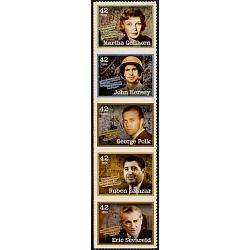

The purchase of this stamp/s will earn you 18 points valued at $0.36.
Vertical strip of five stamps. Very popular. Sold out in only three weeks. Some mint se-tenant stamp, such as these may be supplied out of Scott order due to the format of printed sheets.
Martha Gellhorn (1908-1998) covered the Spanish Civil War, World War II and the Vietnam War in a long career that broke new ground for women. With her constant focus on harm to civilians, her reporting was considered a morally courageous model.
John Hersey (1914-1993) was a versatile writer whose most famous work, Hiroshima, describes what happened when the United States dropped an atomic bomb on the Japanese city that gave the work its title. It has been acclaimed as the greatest work of journalism of the 20th century. Hersey's work appeared in various publications, including Time, Life and The New Yorker.
George Polk (1913-1948) was a talented young CBS radio correspondent who filed hard-hitting radio bulletins from Greece describing the strife that erupted there after World War II. He was working on reports of corruption involving U.S. aid when he disappeared. His body was found a week later. The exact circumstances of his death remain a mystery.
Ruben Salazar (1928-1970) was the first Mexican-American journalist to have a major voice in mainstream news media. His writings in the Los Angeles Times and segments at KMEX-TV on the Chicano movement of the 1960s added richly to the historical record. While in Los Angeles covering a Vietnam War protest, Salazar was killed by a tear gas projectile.
Eric Sevareid (1912-1992) was a writer for the New York Herald Tribune and later a broadcast journalist for CBS radio recruited by Edward R. Murrow. He covered World War II, reporting on the approach of the Germans to Paris, the exodus from the city and on life in London during wartime. In 1943, while en route to China, Sevareid parachuted from a disabled plane and emerged from the jungle on foot some time later. His later television commentaries in the 1960s and 1970s on the CBS Evening News were widely admired.